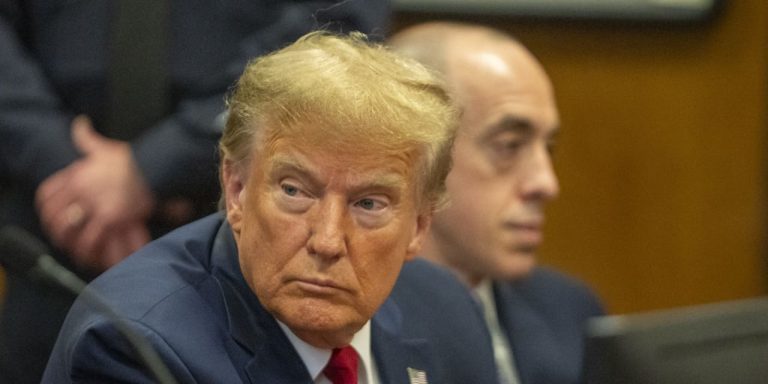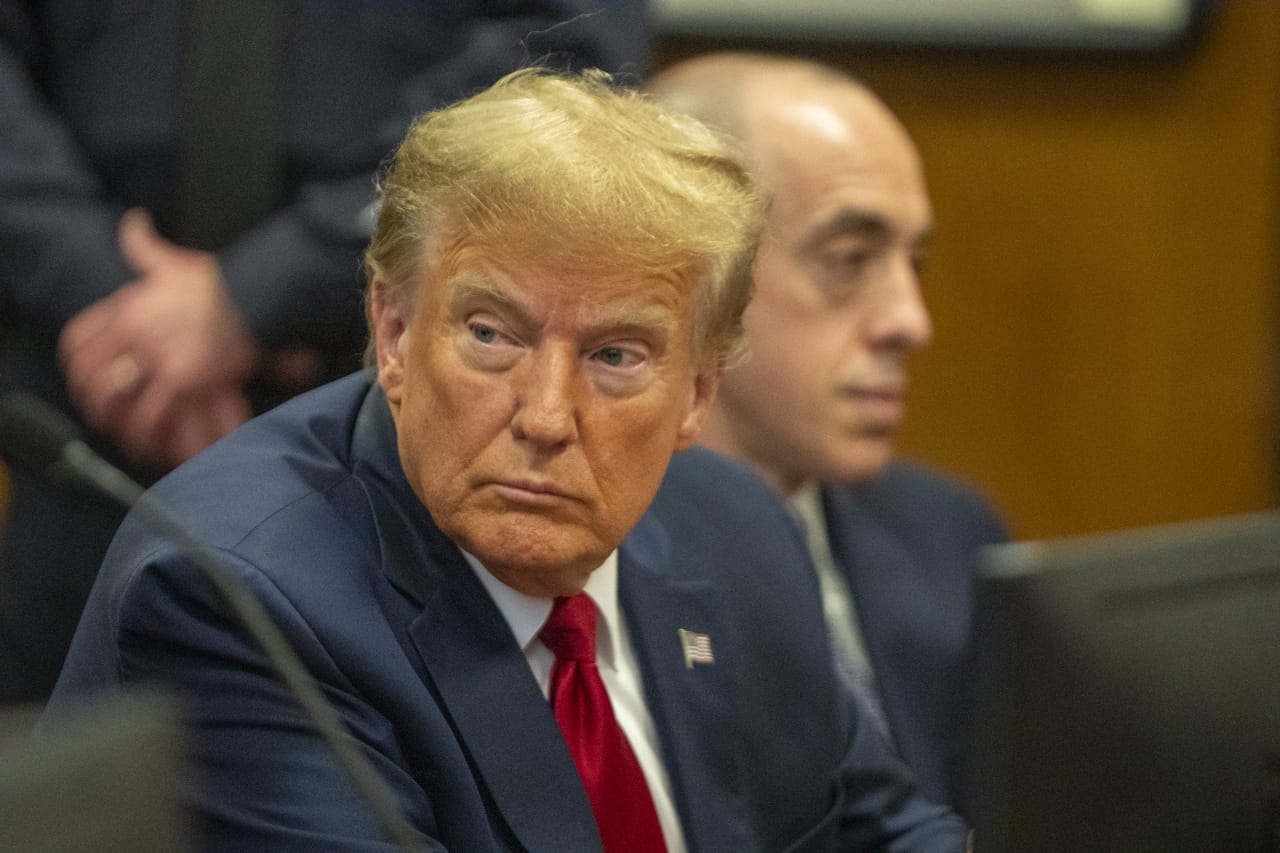A Manhattan judge dealt Donald Trump a major blow on Friday, awarding him a civil penalty totaling more than $450 million and giving him a three-year ban from the New York real estate world.
Trump and the Trump Organization are also banned for three years from borrowing from banks and financial companies registered in New York, according to the judge's order.
However, the decision in the civil fraud case brought by New York State Attorney General Letitia James is not expected to deal a fatal blow to the former US president or the Trump Organization – at least not immediately.
“The Trump Organization will still exist,” said Evan Gottlob, a partner at the law firm Saul Ewing and a former New York City prosecutor who focuses on public corruption and white-collar investigations. “It will be disruptive, but I think it's still there.”
While the Trump Organization would likely stand to lose hundreds of millions of dollars from the fine, the three-year financing ban “may be the worst part,” Gottlob said, because the real estate industry relies on borrowed money. Friday's decision could also include foreign lenders with branches registered in New York.
“In order to develop real estate, you need access to money,” he said.
Weeks before New York Supreme Court Justice Arthur Engoron's ruling, Trump said he would appeal the ruling. Legal experts say the appeal process could take weeks, if not months. A stay order would stop the decision from taking effect during appeal.
“Today’s ruling is a gross miscarriage of justice,” a Trump Organization spokesperson said in an email statement. “If the Attorney General were permitted to retroactively enter into private business transactions between sophisticated parties, no business transaction entered into in New York State would be outside the jurisdiction of the Attorney General.”
Historic ruling
Trump inherited his real estate company from his father in the late 1970s, with his personal life and business dealings frequently becoming the subject of tabloid newspapers over the next four decades.
Trump's real estate business has also led to his brand, his work as a television personality and his rise to America's highest elected office.
The judge's ruling, if upheld, seeks to temporarily bar Trump and his two adult children from working in New York real estate. But it also raises practical questions about how to separate the Trumps from their network of business partnerships, existing lenders, tenants and investors who own the bonds that financed their properties.
The ruling extends the court-appointed monitor's oversight of the Trump Organization to at least three years. But that will be no simple task.
To gain insight into Trump's sprawling business dealings, the monitor has already identified 415 distinct business entities linked to the company — many with borrowing entities, licensing and management agreements — after trimming the number of entities from about 500 during the experiment.
“The commercial real estate business is messy and complicated,” said Will Thomas, an assistant professor of business law at the University of Michigan's Ross School of Business, who is closely following the fraud case against Trump.
“It's the beginning of the headache, not the end.”
Other peoples' money
The New York court's decision brings the multi-year investigation into Trump's business practices to a head as Trump seeks to regain the White House for a second term.
The sanctions are intended to punish the former president for confusing his personal wealth with the value of his properties, a practice that Attorney General James claimed resulted in more favorable loan terms than would have otherwise been available.
Trump has denied any wrongdoing and described the trial as a “witch hunt” while the Republican candidate is campaigning to win his party's nomination in the presidential elections scheduled for November.
Beyond the ruling, the case also highlights how luxury commercial properties are financed, often without the owners putting their personal wealth at risk.
“For decades, Trump has used other people's money in most of his deals,” said Norman Mailer, retired chair of real estate finance at the Knaus School of Business at the University of San Diego.
“Certainly, we must assume that most of them are not guilty of the transgressions in the assessments that Trump has been accused of,” Miller said, adding that the court must recognize that punishing Trump punishes others as well.
Highlight characteristics
In the wake of Trump's first presidency, he was able to refinance a bunch of his outstanding real estate debt, “which strengthened his solvency and liquidity for a period of time,” Miller said.
However, Trump owes about $122 million in senior debt on 40 Wall Street, an office tower in Manhattan's financial district that has long been the crown jewel of the Trump Organization.
That debt, currently on a watch list as a potential default risk, was bundled with other loans in several commercial mortgage bond deals, which were sold to investors more than a decade ago. Trump's loan is scheduled to mature in July 2025, according to CredIQ and Trepp.
be seen: Donald Trump is tightening his grip on the historic Manhattan skyscraper at the heart of a New York court case
Even before Friday's ruling, Trump faced a difficult backdrop for office buildings needing to be refinanced. Major cities, from New York to Chicago to San Francisco, saw office properties, or building debt, trading at discounts of 60% or more.
The distress also lies in the riskier bonds used to fund Vornado Realty Trust VNO,
In its partnership with Trump at 1290 Avenue of the Americas, a 43-story office building in midtown Manhattan.
The senior bonds that financed the building were offered by at least one Wall Street bank at a roughly 5% discount to the original face value in January, after a nearly two-month rally fueled by hopes of interest rate cuts from the Federal Reserve, according to Empirasign. , which tracks trading activity in this sector.
But subordinated bonds, which trade less frequently and are more vulnerable to losses if a borrower defaults, were last valued in October by debt holders at prices ranging from $65 to $75. The bonds are issued with the expectation that they will be repaid in full at maturity at $100.
Vornado did not respond to a request for comment.
Restless tenants
Trump's future in New York real estate and his access to credit have become a major concern for office tenants, said one broker who has directly placed many of the tenants at Trump properties in the past five years.
“This case can be adjudicated and ultimately decided in several ways,” said the mediator, who was not authorized to speak publicly on the matter.
Except in cases of debt defaults, New York City buildings are rarely separated from their owners, even temporarily. The possible precedent was nearly a decade ago, when the US government seized the 36-story office tower at 650 Fifth Avenue in Manhattan in a terrorism-related case, saying it was effectively under the control of Iran.
But after a decade of operating the building, the government's hopes of selling the building for nearly $1 billion, to distribute the proceeds to victims of terrorism, were dashed after the Manhattan Court of Appeals overturned the ruling.


